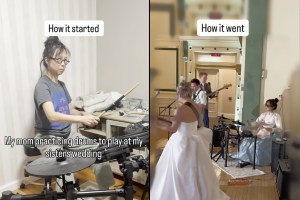“Imagine that you worked in an office building, and you couldn’t leave it for weeks at a time.”
Ensign Christine Conlon says, “That’s what it feels like to be deployed on a Navy ship.”
The USS Ross in port at Souda Bay, Greece. Photo by Spc. 1st Class Theron J. Godbold/Released/U.S. Navy.
Conlon works aboard the USS Ross, an Arleigh-Burke class destroyer (think three pegs in Battleship) stationed off the south coast of Spain. Every season, the USS Ross and its inhabitants are deployed on a four-month patrol in and around the Mediterranean area.
During those deployments, life at sea becomes pretty boring, pretty fast.
So a letter like this can often make someone’s day:
All letters courtesy of Ensign Nick Tsusaki/U.S. Navy.
The letter reads:
Dear Service Member,
Thank you for risking your life for my community. I’m so thankful for what you’re doing. Earlier we wrote about how we were brave. I said I let my sister get KFC instead of me getting Taco Bell. That’s nothing compared to what you do. I can’t say thank you enough. My great uncle was in the military. It would be great if you would write back. I appreciate your courage and sacrifice. Thank you. Happy Thanksgiving.
Sincerely,
Your biggest fan,
Destiny
Sailors may be at sea for several weeks at time, so once they’ve read, watched, and played everything they brought with them on deployment, entertainment can be pretty scarce.
“We really value the small things,” Conlon says. “When you get a package and it’s got a new nail polish or new movies, and you can say ‘All right, I’ll set aside time to do this on Wednesday,’ it gives you something to look forward to.”
The enthusiasm for correspondence is universal. “It’s a delight to get mail,” says Ensign Nick Tsusaki, who works alongside Conlon on the Ross. “Everybody looks forward to getting mail.”
In addition to correspondence from family and friends, military personnel receive thousands of letters and packages from strangers — including from kids.
Letters like this one:
Dear Soldier,
Thak you for prtekteg us. I am in 1st grad but I know a lot.
from Juliette.
Back home in the States, community organizations frequently run letter-writing campaigns and package donations for service members overseas. Every time there’s a mail delivery, personally addressed packages are accompanied by hundreds of letters and cards from citizens around the country.
The anonymous mail often offers a brand of levity that’s entirely its own — particularly when kids are the letter writers.
“It makes your day getting these little kids’ cards. I usually scan through the package for bad handwriting ‘cause that’s how you know they’re gonna be funny. Kids really do say the darndest things,” Tsusaki laughs.
Dear Soldier,
Hello! I hope you are well. Thank you for fighting for us. My favorite thing is soldier. I love soldier. Are you okay? Well I feel happy for you.
Love,
Kinley
The messages often reveal that the kids have little clue what goes on overseas, but they understand that the sailors and soldiers are far from home and could use a little love.
Dear Soldier,
Thank you for risking your lives for other people. I’m sorry if your friends died. I appreciate everything you do for the country.
Your new friend, Michael.
“Even when it’s crazy stuff, like ‘I hope you don’t die’ or ‘Thank you for giving your blood for me,’ stuff like that, it’s still nice to get something that someone took some time to do,” says Lt. j.g. Sean Mansfield.
“And it’s a good conversation starter for five hours of night watch when you’re standing alone with somebody in the dark,” adds Tsusaki.
Dear Soldier,
Thank you for fighting for our country. You are our hero. I know it is scary. I wish I can help you but I am a kid.
Whether the packages contain something funny or something touching, it’s clear that handwritten notes have an amazing ability to make an impact.
Out at sea, sailors aren’t totally disconnected — they’re still able to email family and chat online with friends. But it’s not quite the same as a card or letter handwritten in the mail.
“It’s nice to get a text saying, ‘hey man, you’re the best,’” says Mansfield, “But mail just takes a significantly higher level of care and concern. You know that someone thought about what you wanted, put it in a box, wrote the address, drove it to the post office. You know that person really cares.”
Conlon sums it up in a sentence: “It’s just nice to know someone was thinking about you.”
Want to send a card or letter of your own? You can write to a soldier online via the USO or visit A Million Thanks to learn more about sending physical letters and packages. Your contribution is always appreciated.


































